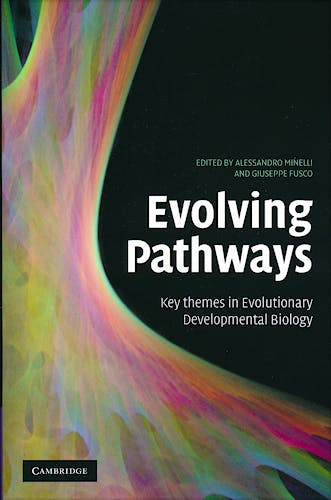

No hay productos en el carrito



Evolving Pathways: Key Themes in Evolutionary Developmental Biology
Minelli Alessandro , Fusco Giuseppe
1ª Edición Julio 2012
Inglés
Tapa blanda
446 pags
632 gr
15 x 23 x 2 cm
ISBN 9781107405455
Editorial CAMBRIDGE
LIBRO IMPRESO
-5%
64,17 €60,96 €IVA incluido
61,70 €58,62 €IVA no incluido
Recíbelo en un plazo de
2 - 3 semanas
Description
Evolutionary developmental biology, or 'evo-devo', is the study of the relationship between evolution and development. Dealing specifically with the generative mechanisms of organismal form, evo-devo goes straight to the core of the developmental origin of variation, the raw material on which natural selection (and random drift) can work. Evolving Pathways responds to the growing volume of data in this field, with its potential to answer fundamental questions in biology, by fuelling debate through contributions that represent a diversity of approaches. Topics range from developmental genetics to comparative morphology of animals and plants alike, also including palaeontology. Researchers and graduate students will find this book a valuable overview of current research as we begin to fill a major gap in our perception of evolutionary change.
Table of Contents
Contributors
Preface
Introduction: Pathways of change
Part I Thinking about evolution by taking development on board 1
1 Evo-devo as a discipline Gerd B. Muller 5
2 Making evolutionary predictions about the structure of development and morphology: beyond the neo-Darwinian and constraints paradigms Isaac Salazar-Ciudad 31
3 Conflicting hypotheses on the nature of mega-evolution Wallace Arthur 50
4 Prospects of evo-devo for linking pattern and process in the evolution of morphospace Paul M. Brakefield 62
5 The molecular biology underlying developmental evolution Claudio R. Alonso 80
6 Evo-devo's identity: from model organisms to developmental types Ronald A. Jenner 100
Part II Evo-devo: methods and materials 121
7 A pragmatic approach for selecting evo-devo model species in amniotes Athanasia C. Tzika Michel C. Milinkovitch 123
8 On comparisons and causes in evolutionary developmental biology Gerhard Scholtz 144
9 Evolution and development: towards a synthesis of macro- and micro-evolution with ecology Hans Zauner Ralf J. Sommer 160
10 When is a Hox gene not a Hox gene? The importance of gene nomenclature David E. K. Ferrier 175
11 Plants are used to having identity crises Rolf Rutishauser Valentin Grob Evelin Pfeifer 194
Part III Evolving diversity 215
12 Unravelling body plan and axial evolution in the Bilateria with molecular phylogenetic markers Jaume Baguna Pere Martinez Jordi Paps Marta Riutort 217
13 Are transposition events at the origin of the bilaterian Hox complexes? Jean S. Deutsch Philippe Lopez 239
14 Many roads lead to Rome: different ways to construct a nematode Einhard Schierenberg Jens Schulze261
15 Basal euarthropod development: a fossil-based perspective Nigel C. Hughes Joachim T. Haug Dieter Waloszek 281
16 Developmental transitions during the evolution of plant form Jane A. Langdale C. Jill Harrison 299
Part IV Evolving body features 317
17 Urbisexuality: the evolution of bilaterian germ cell specification and reproductive systems Cassandra G. M. Extavour 321
18 Thoughts and speculations on the ancestral arthropod segmentation pathway Ariel D. Chipman 343
19 Evolution of neurogenesis in arthropods Angelika Stollewerk 359
20 Arthropod appendages: a prime example for the evolution of morphological diversity and innovation Nikola-Michael Prpic Wim G. M. Damen 381
21 Ontogeny of the spiralian brain Claus Nielsen 399
Index 417
© 2026 Axón Librería S.L.
2.149.0